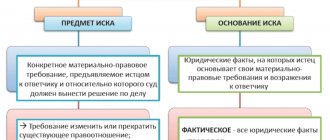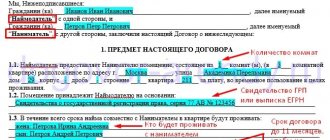Notice of eviction, in accordance with Art. 687 of the Civil Code of the Russian Federation, and Articles 35, 91 of the Housing Code of the Russian Federation is a mandatory condition for the termination of residential tenancy agreements (including lease) and termination of the right to use residential premises. Files in .DOC: Eviction Notice FormSample Eviction Notice
Conditions for eviction
Eviction refers to the loss by a citizen of the right to use or ownership of residential premises, as a result of which he is obliged to leave the housing in which he previously lived as a tenancy, as a family member or as an owner.
Regardless of the grounds for eviction, it can only be carried out by the owner of the premises. So:
- under rental agreements, the initiator of eviction is the landlord;
- upon loss of the right to reside as a family member, the initiator is the owner of the property;
- Upon loss of property rights, the initiator of eviction is the new owner of the residential premises.
Since the right to housing is one of the fundamental rights of a citizen of the Russian Federation, eviction by force is unacceptable.
In order to protect the housing rights of citizens, the law provides for a special eviction procedure, which may include several stages and last for years.
The following stages of eviction are distinguished:
- eviction notice. As mentioned above, this stage is mandatory. Without prior notice, the homeowner will not be able to file an eviction claim in court;
- eviction suit. If a person who has lost the right to use residential premises refuses to voluntarily leave the housing, he can only be evicted through a court decision;
- an appeal against the decision if the claim for eviction is satisfied;
- execution stage. Provided that the court of appeal upholds the decision on eviction or the evicted person does not appeal the decision, the writ of execution for eviction will be handed over to the bailiff. At this stage, the evicted person has the right to repeatedly request a postponement of execution, for example, to appeal the decision in cassation or supervisory proceedings.
- the actual eviction stage. At this stage, the person is either evicted on his own, or his eviction, with the removal of things belonging to the evicted person, is carried out by a bailiff.
How to write an eviction notice
There is no single standard for such documents. In each case, the owner proceeds from his own interests and is guided only by reasons understandable to him alone. Therefore, the main conditions for the validity of the “Notification” are:
- It must be addressed to a specific person who is the subject of the legal relationship. If the agreement is concluded with one person (the head of the family), the notice of eviction cannot be presented to other family members who are not parties to the agreement (children, spouses, parents).
- The “Notification” must indicate the details of the owner (full name or name of the legal entity).
- The postal address must correspond to the actual address of the evicted person.
- The “Notice” based on a violation of the terms of the contract must indicate clauses providing for such a measure of action as eviction;
- For social tenancy agreements - clauses of the Housing Code of the Russian Federation, providing for eviction from the occupied living space.
- The period provided for the collection of belongings and relocation must be within the framework of reasonable business practices. It should provide for the opportunity to pack things, order the service of porters, delivery of a container or vehicle, as well as the period required to find another living space.
Reasons for eviction
The grounds on which a person can be evicted are determined by law and depend on the conditions under which the person lived in the residential premises. Under residential lease agreements, reasons for eviction may be:
- debts on utility or rent payments;
- recognition of the building in which the housing is located as unsafe;
- the need for major repairs of a residential building;
- violation of the rules of residence by the evicte and damage to living quarters;
- change of owner of the residential premises if the owner does not want to renew the lease;
- the owner’s personal need for rental housing.
There is only one basis for recognizing former family members as having lost the right to living space – leaving the family members, for example, as a result of a divorce.
Accordingly, if a former family member refuses to leave the home, the owner will need to go to court with two claims - to recognize the defendant as having lost the right to living space and to evict.
Legal assistance
Drawing up and sending a notice is a rather troublesome procedure. Without legal knowledge, it is easy to make mistakes and completely delay the eviction of a tenant. It is important to understand that a universal notification form simply does not exist. Before filling out a notice to vacate the premises, you need to understand the nuances of the situation.
Do not rely only on your knowledge, because today you can take advantage of free legal advice.
The lawyers of our portal will study your problem and try to help within the framework of the law. The chances of correctly drafting a notice together with a lawyer are many times higher than doing it on your own. Attention!
- Due to frequent changes in legislation, information sometimes becomes outdated faster than we can update it on the website.
- All cases are very individual and depend on many factors. Basic information does not guarantee a solution to your specific problems.
That's why FREE expert consultants work for you around the clock!
- via the form (below), or via online chat
- Call the hotline:
- Moscow and the Region
- St. Petersburg and region
- FREE for a lawyer!
By submitting data you agree to the Consent to PD Processing, PD Processing Policy and User Agreement.
Anonymously
Information about you will not be disclosed
Fast
Fill out the form and a lawyer will contact you within 5 minutes
Tell your friends
Rate ( 1 ratings, average: 5.00 out of 5)
Author of the article
Maxim Privalov
Lawyer. 2 years of experience. I specialize in civil disputes in the field of housing and family law.
Author's rating
Articles written
610
Internet Legends
Use caution when seeking advice from online sources. The vast majority of them have a weak understanding of the eviction procedure, invent non-existent stages of warnings and requirements, and claim that an eviction notice can only be sent after a court decision.
Once again, please note that an eviction notice is a pre-trial form of consideration of a housing dispute. If a person refuses to voluntarily leave the premises, the owner attaches a copy of the notice to the statement of claim and sends it to court.
In the future, after the court’s decision, if the person again refuses to leave the premises, the bailiff will intervene. He sends a notice of voluntary eviction and, if the notice is ignored, proceeds with enforcement.
Also, the assurances that the owner under residential lease agreements is obliged, before demanding eviction, to ask the tenant to eliminate violations and, if they are eliminated, to continue the rental agreement, do not stand up to any criticism. This is wrong.
In accordance with Art. 687 Code of Civil Procedure of the Russian Federation, 35, 91 Housing Code of the Russian Federation, the owner has the right to terminate the contract at any time. There is no obligation to first require the violations to be corrected.
The owner may, but is not obligated to, send requests to the tenant to correct violations. If the owner does not want to continue the relationship with the tenant, he can notify him of termination of the contract and eviction without any restrictive conditions.
What to do after receiving?
Receiving an eviction notice is not a death sentence. If you receive this paper, you must eliminate the reasons that provoked the owner to draw it up, and in the future comply with the living conditions that were agreed upon with the owner of the property.
Upon receipt of a claim-demand, it is also recommended to fulfill everything that the owner of the apartment indicated in it. Often a warning and a complaint have a “sobering” effect on tenants.
If a demand or warning has been sent, it is not recommended to ignore it. Otherwise, legal proceedings are threatened.
Receiving a notification is the last step. All requirements of the document must be fulfilled unconditionally and without extension of deadlines .
Drawing up papers to evict an apartment is a troublesome task, so if in doubt, it is better to turn to specialists for advice and help.
Contents of the notice
The form of pre-trial documents is not regulated, which means that the notification is drawn up in any form with the only requirement - it must be clear from the text who wants, from whom, what and on what basis.
Accordingly, the notification must include the following structural elements:
- Full name of the employer or former family member to whom the notice is sent;
- Full name (name) of the owner of the residential premises;
- a message that by a specific date the tenant or former family member must vacate the premises. The eviction date is set by the owner at his own discretion, taking into account the requirements for reasonable timing;
- communication of the reasons why the owner requires eviction;
- listing possible material requirements, for example, for payment of rent, repayment of debt on utility bills, repairs, etc.;
- a notice that in case of refusal to vacate voluntarily, the owner reserves the right to go to court;
- date of notification and signature of the owner.
Deadlines
There is no clear regulation of the deadline for filing a claim. There is a rather vague provision of the law that the claim must be filed within a reasonable time before the date of the scheduled eviction.
The reasonableness of the timing is determined independently, but it should be borne in mind that eviction (and, accordingly, finding new housing) requires a significant investment of time.
Based on this consideration, we recommend filing a claim at least one month before the scheduled eviction date.
A reasonable period should not be defined as a shortened period of time. Most likely, in the event of a legal dispute, the judge will consider a period of less than a month unreasonable.
Confirmation of delivery
We said above that the owner will not be able to go to court without first sending a notice to the tenant. That is, a copy of the eviction notice must be attached to the statement of claim. Moreover, the fact of delivery of this notification must be confirmed.
In order to receive confirmation, we recommend two ways for you to deliver the notice - in person, against signature, or by registered mail with return postal acknowledgment of delivery.
Sending notification by email is also possible. But on the condition that the email address is reliable. It can be considered reliable if it is contained in the text of the lease agreement, as a method of communication with the tenant, or has been otherwise confirmed by the tenant.
Response to complaint
We have already said above that the tenant can either evict himself or be evicted by a court decision. There are no other options. This means that the claim is not binding on the tenant. He may agree with the claim and evict, he may send a written response to the claim expressing disagreement with the eviction, or he may simply ignore the claim.
To go to court, it does not matter if there is a response from the tenant. The main thing for the court is that the claim is sent to the tenant in a timely manner, and the fact of sending is documented.
On what grounds can they be evicted from municipal housing - explanations from the prosecutor's office
Residents of apartment buildings in the Moscow region are often concerned about the issue of coexistence under the same roof with unreliable neighbors. According to the law, people cannot be deprived of their only home, but in some cases, eviction of citizens from a municipal apartment is possible. The Moscow Region Prosecutor's Office explained in what cases social housing tenants can be deprived of living space without providing another in return. Read more about this in the material of the mosreg.ru portal.
How the Moscow region solves the problem of defrauded shareholders>>
Grounds for eviction from social housing
New flat
Source: , press service of the Khimki city district administration
When transferring an apartment registered in the state or municipal housing stock, a social tenancy agreement is concluded for the use of citizens.
Those who systematically violate the terms of the social tenancy agreement may be evicted from the apartment. The reasons for this may be:
- use of the premises for other purposes,
- systematic violation of the rights and legitimate interests of neighbors,
- mismanagement of residential premises.
Apartment insurance in the Moscow region: cost, payment amounts and insured events>>
Improper use of housing
New flat
Source: , press service of the Krasnogorsk city administration
Sometimes citizens, having received housing under social rent, try to benefit financially from this and set up an office in the apartment, engaging in entrepreneurial activities.
Such activity is qualified as use of housing for other purposes. In addition to organizing offices, this also includes the placement of warehouses and industrial production, as well as the keeping and breeding of animals.
What you can find out about an apartment building in the Moscow region on the public services portal>>
Violation of neighbors' rights
Noise in the apartment
Source: , pixabay.com
Systematic violation of the rights of neighbors is:
- listening to music, using TV, playing musical instruments at night;
- repair or construction work that disturbs the peace of citizens at night;
— violation of the rules for keeping pets;
— violation of fire safety rules;
- committing hooligan acts against neighbors, etc.
For these actions to become the basis for the eviction of troublemakers, they must be systematic, i.e. repeat repeatedly.
Where to complain about violation of silence in the Moscow region>>
Mismanagement of housing
Three apartment buildings in disrepair were dismantled in Balashikha in December
Source: Ministry of Property Relations of the Moscow Region
Another violation on the basis of which they can be evicted is mismanagement of the apartment. This attitude of the tenant leads to the destruction of housing - damage or destruction of windows, doors, floors, walls, sanitary equipment, etc.
How to obtain permission to move a person into social housing in the Moscow region>>
Landlord's procedure
Pile of papers
Source: Photobank of the Moscow region
If the tenant uses the residential premises for other purposes, systematically violates the rights of neighbors or deliberately damages the housing, the landlord is obliged to warn him about the need to eliminate the violations.
If violations entail the destruction of residential premises, the landlord has the right to set a deadline for the tenant to eliminate them.
But if the tenant, even after warning, does not eliminate the violations, the guilty citizens, at the request of the landlord or other interested parties, are evicted in court without providing other housing.
How to transfer premises from residential to non-residential in the Moscow region>>









